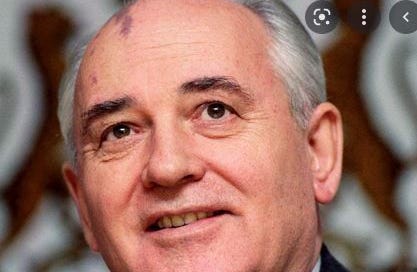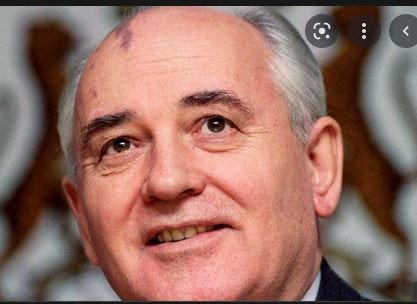God has not been kind to Mikhail Gorbachev to not allow him to die before February 24, 2022 and not witness the senseless destruction of everything he stood for. And perhaps even to reflect how sometime the decision not to use force may later lead to a much greater carnage. If Mikhail Gorbachev had maintained the Soviet Union (perhaps without the Baltics), and used the force the way that Deng Xiaoping did, we might not be now looking at a senseless internecine war that has already claimed dozens, if not hundreds, of thousands of lives, and which in the worst case might degenerate into a nuclear holocaust. Politicians, even those who are the most humane, must unfortunately make this calculation where human lives are just numbers.
Gorbachev openly refused to do so. Perhaps to openly state that was a mistake: nobody was any longer taking him seriously, from Baku to Washington, although he sat atop of the largest nuclear arsenal in the world, the second largest military in the world, hundreds of thousands of police and domestic security forces, and as the Secretary General of the monopolistic party disposed of unquestionable loyalty of 20 million of its members.
By the standards of statecraft, he must be judged harshly, like one of the most extraordinary failures in history. By the standards of humanity, he must be judged much more kindly: he allowed millions to regain freedom, not only proclaimed, but stuck to the principles of non-violence in domestic and foreign affairs, and left his office willingly, when he did not need to do, simply because he did not want to fight and risk lives in order to keep it. But being nice and, in fact, anti-political, he left the field open to much worse men.
He was incapable of running a complicated, fraught by too much history, multinational, and vast empire like the Soviet Union. The country was additionally “saddled” by its reluctant satellites, the unwinnable war in Afghanistan, arms race with a much stronger opponent, and a quasi-stagnant economy. The situation that Gorbachev inherited was far from easy. But, it was manageable, and the fact that nobody predicted the precipitous economic, military, and political decline of the Soviet Union confirms it. Gorbachev, by trying to improve things, made them catastrophic. Many people in retrospect, and perhaps out of respect for Gorbachev (which we do owe to him) tried to explain the descent into the chaos by claiming that the system was “unreformable” and that everything was preordained. The role of Gorbachev, the person, in that view of history is almost non-existent. But this is wrong. A more competent ruler, a savvier politician, a more ruthless man would have handled things differently, and might have forestalled the catastrophe.
The most mysterious part is his rise to power. I do not mean it in a conspiratorial way because there was clearly no conspiracy. The part that must puzzle everybody who reflects on it is the following: given how badly skilled Gorbachev was in handling the economy and politics at the central level, how come that these defects have not become apparent much earlier as he climbed the ladders of power? Didn’t anyone notice that in Stavropol? Moreover, given how willing he was to reject the rule of bureaucrats who brought him to power and who worked with him for several decades, how is it that they have not seen the red danger lights flashing behind that man with the affable smile? How is it that Andropov, not a person who displayed a huge sense of humanity, nor who, by his job description, could have been fooled easily, did not see the fault-lines in Gorbachev that, once in power, would blow up the entire Empire?
I do not think that there will ever be a good answer to that, especially not because Gorbachev did not conceal his opinions nor pretend to be a different person from what he was. The only way to understand how a powerful bureaucracy would let somebody who is going to destroy it climb to power within that same bureaucracy is to believe that Gorbachev’s own views had evolved over time. That when he started reforming the system his view were very much within the acceptable reformist camp, of which even Andropov approved, but that as each step of reforms proceeded, his views evolved in direction of greater freedom, so that at the end he was presiding over a party that was an amalgam of incompatible factions and tendencies, from KGB stalwarts (Kryuchkov), to anti-reformists (Ligachev), to red directors (Chernomyrdin), to corrupt thieves (many Komsomol leaders), to technocrats (Gaidar), to social democrats (Roy and Zhores Medvedev).
Can we draw some conclusions? Regarding politics, we would need a person of Machiavelli’s caliber to describe what happened and why. But for Russian politics of succession, the lesson seems clearer: Stalin could not have imagined that somebody like Khrushchev (whom he treated like a not very smart country bumpkin) could ever succeed him; neither could have Khrushchev imagined that the “beau Leonid” would engineer an internal coup against him; Andropov made a misjudgment on Gorbachev, who in turn underestimated Yeltsin. Yeltsin picked Putin to do one job, but received something entirely different. It is unlikely that Putin alone would not commit the same error.




I think a small comparison between the VKP(B) and the CPC may be useful to readers here.
Contrary to the CPC, the VKP(B) lost almost all of its original generation of revolutionaries and intellectuals in the Civil War (1918-1922). That included almost the entire original Russian industrial proletariat, which was decimated in a span of three to four years. The only survivors of the original Bolsheviks was the Politburo and its immediate circle, which were essentially isolated in the aftermath of the Civil War. To make things even worse, Sverdlov died tragically in 1919 (which, some say, opened the way to Stalin) and Lenin died prematurely in 1924. To put things simply, the situation of 1917-1924 was absolutely brutal, in the literal sense of the word - the mere fact the Bolsheviks survived must already be considered a miracle and an overachievement.
The CPC was also exterminated by Chiang Kaishek (Shanghai, 1927) and, even before 1927, they were systematically picked off by Chiang many times. However, that first generation of the CPC were actually very weak intellectuals and political leaders, borderline social-democrat pacifists. Chiang's extermination of the first communists opened the way for Mao Zedong to rise quickly during the first phase of the Civil War - for the simple fact he was killing his more moderate, social-democrat party competitors. Then WWII happened, and Chiang Kaishek's nationalists were decimated by the Guandong Army (the Army of the Japanese Empire in China), while Mao Zedong had essentially the opportunity to rebuild the CPC on his branch of communism, while developing and gaining support of the peasant class. Hardened by sheer natural selection, the CPC then humiliated the Nationalists in the second phase of the Civil War: if it was not for the Americans giving full air support, the war would have been over in 1946 instead of 1949, such a massacre it was (the Red Army had already destroyed the Guandong Army in 1945).
In other words, CPC got the timing of the maturation its finest generation of intellectuals right. They reached their political apex when the conditions were the finest, while the VKP(B) was the polar opposite. Besides, Mao lived a long life, long sufficiently to prepare the next generation (even then, there was a mini palatial war) while consolidated the base for socialist China; Lenin effectively only led the USSR as a whole for a little bit less than a year (he spent the last two years of his life in his bed).
The urgent situation of the 1930s led Stalin to do the polar opposite of what Mao did. He exterminated what was left of the Bolshevik leadership because of the tense prewar situation and, thanks to WWII, he never had any time to prepare the next generation. His political and economic reforms were definitive, but the central pillar was the politiburo, and there there wasn't any apt substitutes after he died, in 1953.
Also, contrary to the CPC, the VKP(B) never adapted the communist ideology to truly include the peasant class. The problem was that Russia was essentially a peasant empire, and the few original industrial proletariat, concentrated in Moscow and St. Petersburg, were decimated in the aforementioned Civil War. The VKP(B) was essentially an urban party with an urban elite, in an overwhelming agrarian nation. The CPC elite was also urban, but the miracle of the Long March and the windfall of the capitalist self-destruction between the Japanese and the Nationalists during WWII gave them time to "become peasant" in the Northeast ("Yan'an Experience"). Krushchev was a peasant, as was Gorbachev (and also Brezhnev, if I'm not mistaken); they were ill trained ideologically because of the dire situation of the USSR during 1917-1945. I don't know if there's any statistic about this, but I would think that, after Stalin's death, almost the entire Bolshevik elite was peasant (gen. Chuikov, for example, was a literal peasant turned into a general by the Bolsheviks).
Turning the clock forward to 1989-1991, it's funny. The situation in China looks like almost a thing from the ancient legends of History: China was about to fall, as just one domino of the chain that started in the Iron Curtain. Western journalists already were in Beijing awaiting to cover it all in real time, just like they were doing in Eastern Europe. The CPC's Politburo was divided, many favoring the restoration of capitalism. In the direst moment of his political life, Deng Xiaoping personally went to talk to the Northeast divisions (of the 39th Army) - the most ideologically loyal to communism - and gave them an adlocutio. He was trying to convince them they should march to Beijing and kill their own people. Had those soldiers not being convinced, they would have probably mutinied and killed him (thus restoring capitalism in China). But they were. Deng probably used the Northeastern divisions as a thermometer of the masses: if they had no faith in socialism anymore, then socialism couldn't be saved in China.
Western sources stated the suppression of the liberal/capitalist revolt in the Tiananmen Square killed some 3,000 people. Evidence today indicate a lot less were killed: no more than 350. Westerners still worship this event as some heroic act of capitalist (freedom) resistance against communism. The Chinese treat it as some tragic and lesson-worthy event. Communists from outside China probably treat it was a decisive movement to save socialism during its darkest moment, by an exceptional leader. All of them are probably true, they are not mutually exclusive.
Whatever the morality applied, the results are not up to debate: China gained a lease of life in the next three decades, while Russia was reduced to just a shadow of even the late, moribund version of its precursor.
Your line, "If Mikhail Gorbachev had maintained the Soviet Union (perhaps without the Baltics)" contradicts your own analysis of the break up of multiethnic states (at least, how I understood that analysis): that the states with the largest regional/ethnic income inequality came to an end which applied to both the SU and to Yugoslavia.
But yes, keeping the nationalist demon in a box and moving away from the SU model towards a more or less social democratic society with the SU (less Baltics) intact, would have been a blessing.